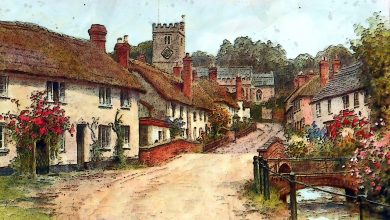
Our Pipes by Henry Lawson is a story that provides a glimpse of the tender human within a rugged man by exploring the themes of connection, respect, rebellion, hardships and loss. The story is narrated by an unnamed narrator in the first-person point of view. The narrative is essentially a long conversation between the unnamed narrator and Jack Mitchell. “Our Pipes” is taken from Lawson’s collection of stories While the Billy Boils, a collection of 52 short stories. The anthology was published in 1896. While the Billy Boils includes stories like The Bush Undertaker and Settling on The Land, the summary and analysis of which may be found in the link below:
Summary of The Bush Undertaker
Summary of Settling on The Land
Our Pipes | Summary
The story begins at night with the description of the moon on the edge of a smoky plane. The narrator and his friend, Jack Mitchell are camped behind the fringe of mulga – an Australian term for the Bush or a wilderness region. Behind them, there are numerous timber trees. From where they are sitting, they are able to see the moon in front of them that looks like a big new copper boiler that had a lot of rags and straw burning inside and was put on the horizon, facing them.
The narrator and Jack Mitchell sit tiredly after a long day of their work. They had tramped twenty-five miles on a dry stretch of land, that too, on a hot day and finally reached the water two hours after it had gotten dark. They didn’t rest for one minute and completed the last ten miles of their tramp without stopping and resting. The narrator assures that they knew that if they had sat down and rested, their leg-sinews would stretch like hot wires and thus they would be unable to get up, both mentally and physically.
Both of them first get billy boiled and then gather some leaves and make beds for themselves from them and have the swags rolled out. They say their prayers. As they have some cooked meat and a few Johnny cakes left, they don’t feel like cooking anything due to the weariness sweeping through their bones. They put the tea and their tucker bags between the top for their beds and the pipes and tobacco in the crown of an old hat so that they have access to it and don’t have to get up each time. Due to being tired, they aren’t able to eat but they drink a lot of tea instead. Lying down, they both take some rest after which they start smoking and talking to each other.
The two men start talking and begin cursing the society because they aren’t rich enough to afford luxuries. . Feeling better than before, they end on the topic of smoking after many other topics. The narrator asked Jack Mitchell about how it is that he started to smoke. Jake Mitchell informs him that he first started to smoke when he was around the age of fourteen or fifty, He firstly had some kind of weed, he had already forgotten its name, but knew that it wasn’t tobacco; after that, he moved on to cigarettes, not the ones that cost a penny each that they smoke now – it was something cheaper. Having tasted cigarettes, Jack Mitchell thought that he should try to smoke a pipe.
Jack Mitchell, as he tells the narrator, was a resident of Surry Hills in the city of Sydney. The place, at the time he lived there, was very different to now; it was nearly all sand. His parents were alive and they all lived at home, except Tom. One evening while Mitchell was playing marbles outside his house, a boy they knew gave his pipe to him to look after while he attended a church meeting. Since the pipe was alight, his mother smelled the tobacco smoke on him, when he returned to the house and accused him of smoking. He didn’t even deny the accusation but he told his mother that he didn’t have the pipe with him as it was Jim Brown’s. His mother scolded Jim Brown but Mitchell believed that it wasn’t his fault because Jim only gave him the pipe to look after. Mitchell says that he didn’t smoke the pipe at that time because he had respect for Jim Brown.
Taking a long look at the moon which had risen from the surface and looked small and cold floating away between the stars, Mitchell tells that the morning after, he felt much better, though he wasn’t cured. The first time he got a clay pipe and tobacco, his mother put it in the stove and he found it. The second time she got smarter and Mitchell was unable to find out what she did. He suspected that his father took it because he saw one very similar pipe in his hands. The next time, he got a cherry pipe which was hard to break and hid the bowl and the stem in different places which he admits, wasn’t a great idea. One day, as he was smoking in the back, when she came and caught a whiff of the smoke, found the bowl but not the stem because he had hidden it. She took the bowl and he had the stem, but that gave him no pleasure.
Mitchell gave up for some time after that and started smoking cigars which were the safest. But they also cost him two shillings a week so he moved back to the pipe and his mother finally gave up. She had been dead for seventeen years now.
The narrator asks him about how his father reacted to his smoking. He replies that he seemed to have lighted up and he lived off Mitchell’s mother and he asked for a refill. The narrator agrees that his father, too, livened him up. Mitchell tells the narrator that he shared many a thoughtful smoke and then later that he died twelve years ago.
Our Pipes | Analysis
The story begins with the two characters, the unnamed narrator and his companion, Jack Mitchell. Both the characters, being swagmen, have a strong bond between them as they understand each other’s hardships and work. A swagman (also called a swaggie, sundowner or tussocker) was a term used to describe a transient labourer who travelled by foot from farm to farm carrying his belongings in a swag (bedroll). The term originated in Australia in the 19th century and was later used in New Zealand.
The two swagmen know the difficulty of living in the outback and have no company besides each other. The reader senses a bit of admiration that the narrator seems to have towards Mitchell for his consistency in having a smoke. Mitchell is shown as persistent towards smoking and rebels against his mother when she tries to take away his pipe so much that in the end, she gives up and leaves him to his devices. The actions of both the characters are in perfect sync with each other which further shows the reader their companionship; they both decide not to sit while walking and later, lie in a similar position to protect their calves.
The story lacks physical actions but rather shows the like-mindedness of both the characters. They know how difficult their occupation is and thus, are careful and conserve their energy as much as possible. Both of them have had a hard life and, at the end of the day, just want to smoke their pipe and relieve their stress. This can be seen as a reward for all the hardships and difficulties they had gone through during the day as they were doing their jobs. The narrator is seen as asking the most questions and we get to know almost nothing about his life other than that his father was “livened up” by his smoking. The narrator comes off as a curious person who wants to know as much as possible about his companion.
It is shown that Jack Mitchell had several pipes growing up which shows his persistent and stubborn behaviour towards smoking pipe. Regardless of what his mother wanted him to do, Mitchell was determined to continue smoking. He earned the respect of his father who was unable to continue smoking because of Mitchells’ mother who had forbidden him. The role of the narrator, in this story, seems to be that of a facilitator to Mitchell’s stories. Mitchell trusts his companion, the narrator, and therefore, tells him his childhood stories. His persistence and stubbornness went so far that even when his mother asked him to quit and threw out his pipe, he found other witty ways to continue smoking.
In the end, the author explores the theme of losing something or someone dear to a person. As the reader sees that, Mitchell has lost his mother who died seventeen years ago and then his father, twelve years ago but the reader is given the impression that he still misses him. Of course, one may argue here, that the loss of a parent is difficult on a child no matter how old they are and how long it has been. But here, it is not just as if he has lost his father, he has lost someone whom he respected and had a very strong bond with. The loss is still fresh in his mind and he is still hurt about it. His father was the only one in his household who supported his smoking and encouraged it. It may be possible that now, Mitchell smokes so as to remember his father and not out of persistence or routine.
The swagmen have a reputation of being tough and burly, but here we see that both the narrator and Mitchell defy this stereotype. The narrator is seen to be very compassionate towards his companion and doesn’t pressure him to share his story; he comes off as friendly and open. On the other hand, Mitchell is someone who is still mourning the loss of his parents, especially his father even after twelve years. Despite having a rebellious streak, he is someone who has deep thoughts and feelings. From the narrator’s point of view, Mitchell’s story is really the story of “our pipes” – our stories that we hold within ourselves, thus making it an apt title to this piece. The pipes that the swagmen smoke hold within them entire stories of the most intimate aspects of their lives that are waiting to be heard by anyone willing to lend an ear.
Our Pipes | Literary Devices
The most recurrent literary device used in this story is repetition. Repetition is used to emphasize a topic. In the beginning, while explaining his work during the day, the narrator repeats the phrase “the swagmen would know” several times, making it a point to show that no one else would be able to comprehend what hardships they go through better than themselves. Later on, while Mitchell is telling about his childhood days, the narrator repeats the phrase, “Mitchell reflected”, which may mean that he is trying to remember the incidents and that his memory might not be as good as it had once been.
Our Pipes | About the Author
Henry Archibald Hertzberg Lawson was an Australian writer and a bush poet. He is among the best known Australian poets and fiction writers. His most famous works include In the Days When the World Was Wide and Other Verses (1896), While the Billy Boils (1896), Joe Wilson and His Mates (1901) etc.





